- Home
- Linda Byler
Christmas Visitor Page 2
Christmas Visitor Read online
Page 2
“I think so.”
Completely rejuvenated, they bent their backs to the task with the plastic buckets by their sides. The sun suddenly seemed much more comfortable than it had ten minutes before.
Esther was in the house filling her usual role as the bossy older sister. She had her little bib apron tied around her waist and was caring for Benjamin while scolding Lillian for getting beads in the baby’s face.
“Lillian, now get away from him!” she screeched, her dark hair wet with the sweat from her forehead, her dark blue eyes intense, her hands on her hips, for all the world a replica of a little biddy hen protecting her chicks.
Ruth washed her hands at the sink and dried them on her apron.
“Your face is red!” Lillian shouted.
“It’s hot outside,” Ruth answered, smiling.
“Mam, you have to stay in here. That Lillian is a mess. She won’t listen to me. She just keeps getting at Baby Benjamin. She’s driving me nuts!”
“Now, Esther. Don’t say it like that. That’s going a bit overboard.”
“Well, I don’t know how to say it so that you’ll listen.”
Ruth hid a smile as she stooped to pick up Lillian, buckling down yet again to the responsibility of raising this brood of six children alone without ever showing the worries that threatened to overtake her.
When Ben was alive, they had been busy. The farm required physical labor day after day, but the responsibilities and the decision making had been shared. It made a difference. There was so much to be shouldered alone.
The first thing to go had been the battery lamps. It was easier to fill a plastic can with kerosene to fill the lamps they used in the bathroom and bedroom than it was lug those heavy twelve-volt batteries around. Yes, the kerosene was smelly, and she had to wash the glass lamp chimneys each week, but it was easier to manage. She had also learned to change the propane tank for the kitchen lamp, a job she had never accomplished before Ben died.
Now she also had to harness Pete, the driving horse, all by herself, and with Elmer lifting the shafts, hitch him to the buggy to drive to church or the grocery store herself. She had become used to it, and it wasn’t so bad, though she did often worry about driving alone with the children.
The responsibility of making decisions about the children was not easy, ever. Should Elmer be forced to return to Priscilla’s corn patch? Would it be best to make him continue to work hard at a job he despised? Or should she take pity on him and allow him to stop? Which was best—building character or understanding his total dislike of Priscilla and her weedy corn patch? That was when she needed Ben so badly. That was when she felt defeated, but only as much as she allowed herself, she soon learned.
All her life, courage had just been a word—much like virtue or hope or fear or any other word—until she’d been alone. Courage was now a noun. She had to buckle it on, like a harness or a back pack, click the plastic fasteners into place, take a deep breath, and just get going with it.
Dealing with Esther and Lillian took courage. Dealing with perfect little Barbara and her abrasive, yet sensitive, brother took courage as well. And on and on.
But this day ended with a perfect late summer evening, and as the sun slid behind the cornfields and the twilight folded itself softly down around them, they took a pitcher of iced mint tea out on the front porch and a bag of Tom Sturgis pretzels with some ranch dressing to dip them in. The lawn was clipped evenly, the edges of the flower beds were trimmed, and the garden contained no weeds—at least as far as Ruth could tell from the porch. Benjamin was settled for the night, and Lillian curled up on her lap, her tousled little head quiet at last. And Ruth knew she was not alone. God was right there with her and the children, supplying backpacks full of courage when she needed it.
The Lord giveth, and the Lord taketh away. Yes, of course. It was God’s will to take Ben, for reasons we don’t know, her mother had said. So had Aunt Lydia and Eva. The true test of faith is in accepting and trusting God when life’s events leave us without understanding.
Why her? Ruth had questioned many times in her heart, but only once to her mother.
Dear Mam. Ruth’s rock of comfort. When all else failed, her Mam was there with her large blue eyes and wrinkles and crow’s feet that all somehow reflected her life—the garden, the wringer washer, the harrowing, hay making, cooking and baking, laughing and crying, teaching, and being stern in the way only Mam could, living her life with Dat, her life’s partner for more than thirty-five years.
Tomorrow, Mam would come for the day, bringing a spring wagon loaded with corn. Incredible, her specialty.
“Did you know Mommy (Grandmother) is coming tomorrow?” Ruth asked the children.
“Is she?”
“Yes, we’ll be freezing corn.”
“Goody!” Esther clapped her hands.
“Can we eat all we want all day long?’
“Of course!”
The prospect of having Mommy Lapp come to their house the next day provided a sense of anticipation. Their happiness replaced the usual melancholy that often settled over them at night, when the children missed Ben most.
Mommy Lapp might let the boys drive Ginger, her trustworthy driving horse, if they needed something at the store. Ruth glanced at Elmer, knowing what he was thinking, and grinned.
“You might be allowed to drive Ginger.”
Elmer laughed, then watched his mother’s face before saying, “Mam, I worry about training a horse. Who will buy me a buggy, or teach me to drive my own horse if…Dat is….” He stopped and swallowed, then reached self consciously for another pretzel as if that act of normalcy could cover his embarrassment.
“Oh, that’s a long way off, Elmer.”
But after the children were in bed, Ruth returned to the porch. She aimlessly rocked in the wooden rocker and thought of what he’d said.
Who would? She didn’t think about being married to someone else. How could she ever be unfaithful to the memory of Ben? He lived on in her heart and in her mind. It wouldn’t be right.
She’d teach Elmer. Somehow they’d acquire the money for a horse and buggy. Elmer had always been a serious thinker, well beyond his years, and now, without Ben, he was especially so. They would manage.
No, she could not imagine subjecting these children to a new relationship. It would not be fair to them. It would be entirely different if she had only one or two children who were too young to understand. But at the age of ten, it would be too hard for Elmer and even the others—except perhaps her little Benjamin.
In the morning, the children were up and dressed, except for Lillian, who hadn’t slept long enough the night before, when Ruth’s mother drove up to the barn with the corn piled high on the back of the black spring wagon.
Ruth hurried out to help her unhitch, followed by the children, leaving little Benjamin howling in his bouncy seat.
“Ach (Oh) my!”
Ruth hurried back into the house, crooning as she took up the unhappy newborn and cuddled him against her shoulder, bouncing him and patting his back. She looked out at her mother, surrounded by the children, her back bent slightly, her gray apron lifted to one side as she reached into the oversized pocket sewn on the side of her dress and extracted a heaping handful of Tootsie Rolls—every flavor imaginable.
Ruth smiled, knowing the sugar-laden candy would just have to be consumed before breakfast as Mommy Lapp pooh-poohed the idea that candy wasn’t healthy. Ruth figured scrambled eggs and toast could aid its digestion.
Her mother entered the kitchen. She was a small woman with a rounded stomach and a bit of fullness around the hips, having borne eleven children of her own. She said she needed the extra padding. It was what kept her going. Her hair was pure white, neatly rolled at the sides, and pinned in the back beneath her large, white covering.
Mam was a dienna’s frau (minister�
�s wife). Her coverings were large, and she wore a belt apron pinned around her waist. Her clothes were conservative as a good example for the younger generation. Radiating kindness and caring, her work-worn hands were always ready to be laid on a suffering one’s shoulder or slipped about the waist with whispered words of condolence that were always as available as the air she breathed.
Mam sat down. She gathered Barbara in one arm and Esther in the other, stroking their backs and saying, “Oh, girls, it’s so good to see you again. It’s been too long. I make myself too busy in the summertime, gel (right), Ruth?”
“Well, no Mam, you still have Emma and Lydiann at home, plus all those big boys who should be dating and getting married. I declare they are spoiled with you for their mother.”
Highest praise, Ruth knew, and she was rewarded by a smile of pure benediction.
“Oh.”
That was all she said, but Ruth knew her mam loved having her boys around her, cooking huge breakfasts for them with fried mush and dried beef gravy and applesauce and shoofly pie and hot chocolate.
“Couldn’t Emma come?”
“No, she goes to market with Lydiann on Saturdays now, too.”
“Really?”
“Yes, David Kind gave her a job at the produce stand.”
“Well, that’s good.”
“Yes, she’ll be glad for some spending money. Lydiann was so busy she could hardly keep up with the customers, so she said something to David about it, and he said Emma could start last week.”
“Is that market so busy already?”
“Well, in New Jersey fresh produce from Lancaster is quite popular.”
Ruth nodded.
Farmer’s markets were a way of life for many single Amish girls who worked long hours on the weekends selling produce, baked goods, meats and cheeses, or prepared foods like chicken, pulled pork, and a variety of barbeque. They were huge, indoor markets with many different vendors, bustling places filled with homemade or homegrown food, mostly within a 100-mile radius of the Amish farms of Lancaster County.
There was a high-pitched shriek from Ruth’s room, and dutiful Barbara went to find Lillian, reappearing with the crying three year old on one hip. Lillian was indignantly wailing and hitting her sister.
“Lillian, do net!” Ruth called from her rocking chair where she was feeding Benjamin.
Instantly, Ruth’s mam was on her feet, trying to take Barbara’s heavy, writhing load from her and saying, “Komm, Lillian. Komm. Mommy iss do (Grandmother is here).”
Lillian’s shrieks only increased in volume, so Barbara let her slide to the kitchen floor, where she resumed her howling. When Mommy tried to pick her up, Lillian twisted and turned, her legs flailing, her nightgown revealing the large disposable diaper she still wore.
“Ich vill my tootie! (I want my pacifier!)”
Quickly, Barbara scuttled down the hallway to look for the missing pacifier, which, when presented, was refused. The shrieking resumed. Without a word, Ruth rose from the rocking chair, handed the baby to her mother, and bent to pick up her struggling daughter. She took her directly to the laundry room, where she administered a firm “reprimand,” letting Lillian understand that such behavior was completely unacceptable by using the age-old method of the Plain people, who still honored the meaning of molding a young child’s will.
Later, with Lillian’s head on her shoulder and her pacifier in her mouth, Ruth explained to her that throwing a fit was not allowed as she was a big girl now. Lillian hiccupped and sniffed but stayed quiet, watching her grandmother warily.
Mommy cooked a large pan of scrambled eggs and filled the broiler of the gas stove with slices of homemade bread. She sadly noted the absence of bacon or sausage in Ruth’s refrigerator that contained so little, but she said nothing.
“I brought a coffee cake. Elmer, can you go get it? It’s under the seat.”
“I’ll go!” Roy yelled, almost upsetting his chair in his urgency to please his grandmother.
Later the women drank coffee alone as the children unloaded the corn outside. Mam asked Ruth how she was managing, her large, blue eyes round pools of love and caring, which always and without fail produced tears she did not want to show.
Ruth nodded, struggling for control. She got up and grabbed a handful of Kleenex as she drew her upper lip down to help stay the onset of emotion.
“Alright,” she said.
No, Mam, actually I am not doing well. I’m afraid I’m not doing the right thing with Lillian. I’m weak and tired, and I miss Ben so much I want to die sometimes. I’m afraid my money will soon be all gone, and I feel guilty for everything I spend because it’s really someone else’s hard-earned money.
But she did not say that.
“Just alright?”
Ruth nodded, unable to speak. She was afraid one word would strangle her and open the floodgates of self-pity and grief and helplessness and inadequacy.
Mam cut a slice of coffee cake with the side of her fork, put it carefully in her mouth, and chewed, wisely allowing Ruth time to salvage her pride.
“It’s Lillian, isn’t it?’
Ruth nodded, avoiding her mother’s eyes. Down came those mother’s hands, the hands of a dienna’s frau like the hands of an angel, taking up both of Ruth’s and accompanied by healing words of praise and encouragement.
“Ruth, you did exactly the right thing. You amaze me with the quiet way you have with these children. Lillian is different, but you know as well as I do that not one child is the same as the others. They are all given a different nature, and Lillian is just…well.”
Ruth lifted her eyes to her mother’s, saw the humor, those little stars of goodwill, and laughed.
“Mam, you know what she said the other day? She said she is going to put Benjamin in the rabbit hutch where he belongs.”
Mam laughed heartily.
“I know, Ruth. She’s a character. She’s jealous, likely, of the new baby. And on top of that, she doesn’t really understand about Ben.”
“You noticed the Pamper?”
“Yes.”
“She’s three, Mam. I’ve never had a problem training any of my children. Till now. She’s so stubborn. She knows better, but she just doesn’t care. It simply tries me to the limit.”
“And she will often continue to do so—throughout her life, no doubt. She reminds me so much of your sister, Betty.”
“Help us all!” Ruth said, laughing.
Betty was Ruth’s sister, who had taught school for many years. She often spoke her mind to distraught parents, roiling the calm waters around her with blunt remarks that were not always well received. She had finally married a bachelor at the age of twenty-seven, and her marriage was less than peaceful now, even after only a year and a half together.
“Poor Reuben.”
“Oh, he takes care of himself.”
And so the conversation carried on throughout the day as only the chatter of mothers and daughters can. They hopped from one subject to another as they sat on folding lawn chairs under the oak tree in the backyard with wheelbarrow loads of corn and piles of husks surrounding them. The dishpans were piled high with the heavy ears of yellow corn, brushed clean with vegetable brushes.
The two-burner outdoor propane cooker bubbled away as it cooked the corn, which, after being heated through, was plunged into the cold water in the cooling tubs. Roy manned the tubs, and the cold water from the hose often strayed, spraying his sisters or Elmer.
When the corn was completely cooled, the dishpans were filled again and set on a bench where Mam and Ruth cut it from the cobs with sharp knives. Some of it was creamed by sliding the cooled ears of corn across the stainless steel corn creamer. The device had a long, rounded shaft with jagged teeth built into the center, which tore the kernels into small pieces and creamed it for baked corn or just to be eaten with b
utter and salt.
They set up the corn eating station on the wooden picnic table with salt and butter at each end and a Corelle platter of sliced tomatoes, a jar of mayonnaise, and a loaf of sliced whole wheat bread in the middle.
For a small woman, Mam could eat so many ears of corn that it was almost alarming. She applied the butter with a liberal rolling of the ear of corn, over and over across the cold goodness of it. She poured on the salt with the same generous hand and continued by lowering her head, her teeth crunching. She stopped only to roll her eyes and voice her pleasure before buttering another ear.
Ruth agreed. Corn, especially the variety called “Incredible,” was exactly that—rows of perfect yellow kernels bursting with flavor and a sweetness so good it was impossible not to look for another good ear after finishing the first one.
They wiped away their perspiration and cooled themselves by drinking cold beverages and plunging their hands into the cold well water, which also helped tremendously.
“Lillian, voss huscht (What do you have)?” Mommy called.
Ruth shrieked and grabbed at the fat, green tomato worm Lillian was laying gently on top of the cooled ears of corn.
“My worm!” Lillian cried. She quickly picked it up and deposited it in the sandbox, where Ruth decided if she wanted to give the worm a ride with the plastic dump truck, she could.
And Mommy allowed Elmer to drive Ginger the whole way to the freezer, the electric one kept in an English neighbor’s shed. Other Amish families also paid a set fee every month for the privilege of having a large chest freezer there.
Mommy told Elmer he was a good driver, even though he almost upset the spring wagon by turning too short. Later she sprouted a summer cold sore where she’d bitten down hard on her lip so she wouldn’t yell in fright and perhaps hurt Elmer’s feelings.
After the day of freezing corn, Ruth also made spaghetti sauce, pizza sauce, salsa, and tomato soup, turning bucket after bucket of brilliant red sun-ripened tomatoes into row after row of colorful Ball jars of goodness, which were stored in the cold cellar with the pickles and red beets, the corn and zucchini relish. There was still applesauce to be done, and peaches and pears and grape jelly and grape juice.

 A Second Chance
A Second Chance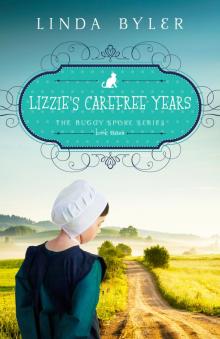 Lizzie's Carefree Years
Lizzie's Carefree Years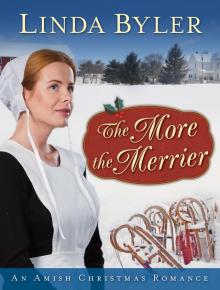 The More the Merrier
The More the Merrier Love in Unlikely Places
Love in Unlikely Places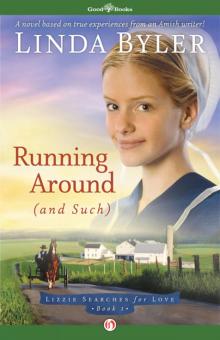 Running Around (and Such)
Running Around (and Such) Wild Horses
Wild Horses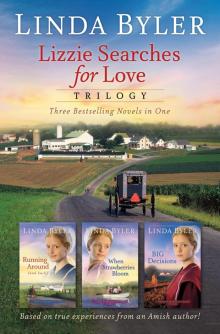 Lizzie Searches for Love Trilogy
Lizzie Searches for Love Trilogy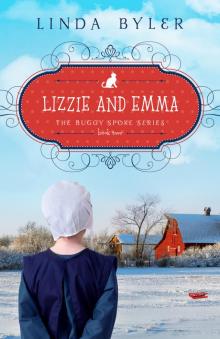 Lizzie and Emma
Lizzie and Emma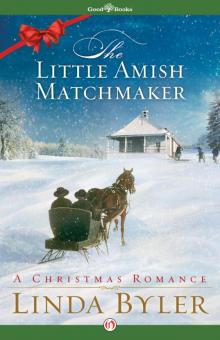 Little Amish Matchmaker
Little Amish Matchmaker The Witnesses
The Witnesses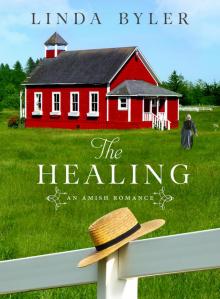 The Healing
The Healing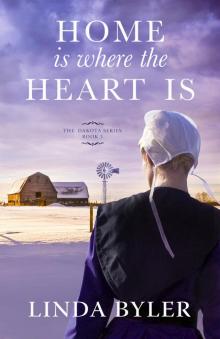 Home Is Where the Heart Is
Home Is Where the Heart Is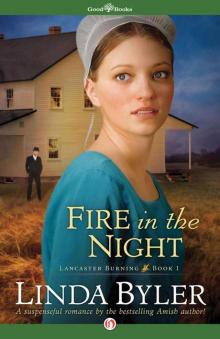 Fire in the Night
Fire in the Night When Strawberries Bloom
When Strawberries Bloom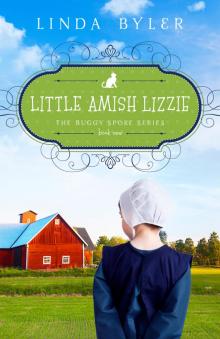 Little Amish Lizzie
Little Amish Lizzie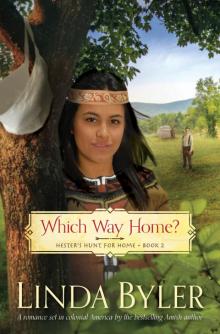 Which Way Home?
Which Way Home?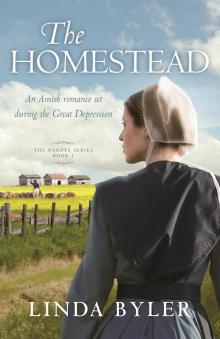 The Homestead
The Homestead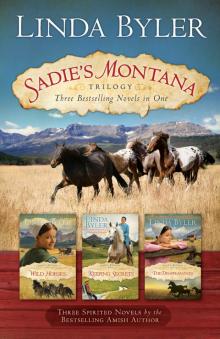 Sadie’s Montana Trilogy
Sadie’s Montana Trilogy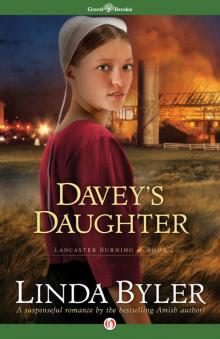 Davey's Daughter
Davey's Daughter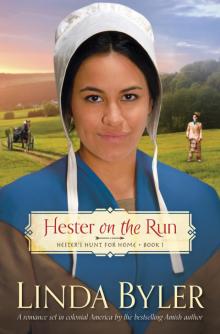 Hester on the Run
Hester on the Run Disappearances
Disappearances Big Decisions
Big Decisions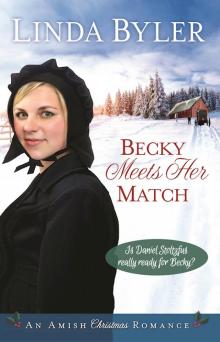 Becky Meets Her Match
Becky Meets Her Match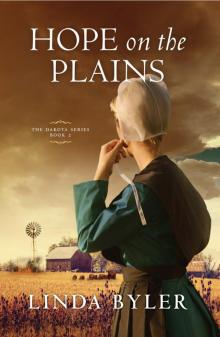 Hope on the Plains
Hope on the Plains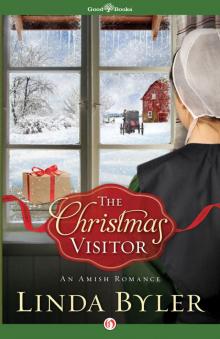 Christmas Visitor
Christmas Visitor